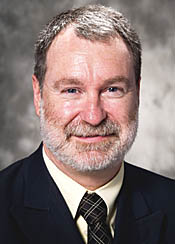|
|
 |
| |

The Royal Free Hospital

Andrew Way |
Is it efficiency or just cuts?
It’s not about hiring and firing
hospital staff, says hospital chief Andrew Way, it’s about
improving services
ARE you fed up with hearing about efficiency savings and
wonder if they’re really just cuts in disguise?
It wouldn’t be surprising. We are naturally cautious
when it comes to changing public services that we know and think
we understand, even if we don’t exactly love them.
We don’t take kindly to people mucking about with them,
especially when they involve some of the things closest to our
hearts and those important to us – birth, life-threatening
illness, “miracle” cures, death.
But the health service, like everything else, is changing. And
I really believe it’s for the better, even after this week’s
uncomplimentary headlines about hiring and firing.
Think about which of these two scenarios you prefer. You come
in for an operation on Monday morning. You wait around in a
ward all morning. Not much happens. A couple of doctors come
and see you at different times and ask you questions (often
the same ones). It’s quite interesting watching the comings
and goings for a while, but then you get bored and start thinking
of all the things you could be doing at home. There isn’t
even the distraction of lunch because you can’t eat before
your operation. You don’t go to theatre until late afternoon
and are back on the ward sometime during the evening. You spend
the night on the ward, not sleeping but watching the staff and
other sleepless patients and listening to the snores of those
who have managed to get to sleep.
The next day a junior doctor sees you first thing and tells
you can go home. Great! But you need a prescription for antibiotics
and pain-killers, and although the doctor has written them in
your notes, pharmacy is very busy in the mornings and you have
to wait four hours.
So you don’t actually leave until the afternoon, exhausted
but relieved.
Scenario two is like this. You come to the hospital about two
weeks before your operation, the date of which you have chosen
with the booking staff.
At that appointment, any risks the anaesthetic poses to you
are assessed, the surgery is explained to you and you ask questions.
The consultant talks through what medication you will need after
the operation, so it can be ready for you when you go home.
He writes up a prescription for the things you are most likely
to need so that if necessary they can be dispensed promptly.
Two weeks later you arrive first thing in the morning, have
your surgery and spend time on the ward recovering.
You’re told you’re well enough to go, your medicines
are ready for you and you go home to your own bed – the
destination of choice for anyone when they’re not feeling
well and especially as there you can hear your own partner’s
snoring.
In all other aspects of our lives we look for the convenient,
effective option, whether it’s a mobile phone, a new kitchen
or a mortgage. Why should healthcare be different? We know that
the longer we spend in hospital, the more likely we are to catch
infections, the more likely we are to develop blood clots, the
more confidence we lose in ourselves to cope at home. Surely,
unless we really need to be in hospital, we shouldn’t be
there?
But if, as the tabloids have claimed, I’m firing doctors
and hiring managers, surely patients will suffer? First, I’m
not firing anyone – we have now worked out that the necessary
financial savings can be achieved by leaving current vacancies
unfilled, and not renewing temporary contacts, as well as making
our services more efficient in the way that I have described.
Second, we must ensure that doctors and nurses are concentrating
on what they are good at and what patients need them to be concentrating
on, in other words, patient care. If we employ the right people
to do the right jobs, we can save money.
I can pay a clinical consultant £100,000 a year to spend
part of her time compiling statistics to work out whether or
not the service she is providing in her clinic is the best possible
one for her patients; or I can let her spend all her time on
patients and pay a statistician £30,000 a year to do the
statistics for her and lots of other doctors. “Firing doctors
and hiring managers” may be a neat headline but, like many
neat headlines, that’s all it is.
|
|
 |
|


